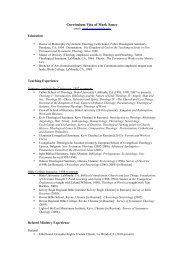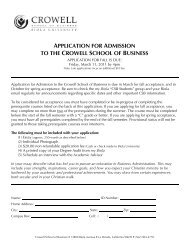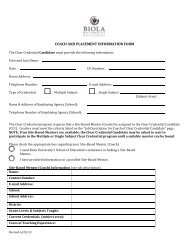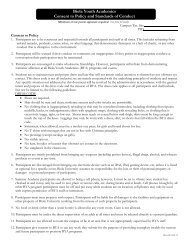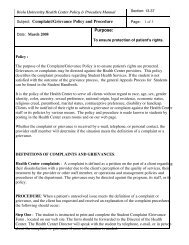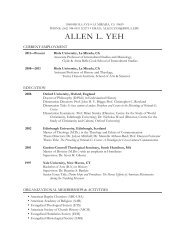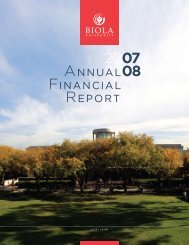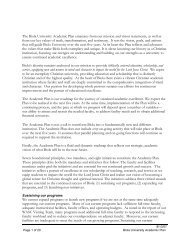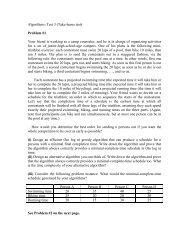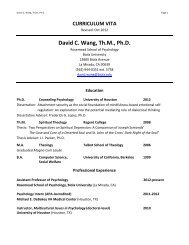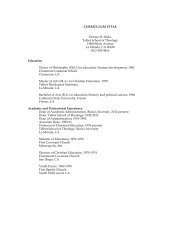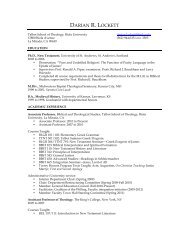Program Handbook (PDF) - Biola University
Program Handbook (PDF) - Biola University
Program Handbook (PDF) - Biola University
You also want an ePaper? Increase the reach of your titles
YUMPU automatically turns print PDFs into web optimized ePapers that Google loves.
COOK SCHOOL OF INTERCULTURAL STUDIES <br />
GRADUATE PROGRAM HANDBOOKS <br />
changes in another work without citation is still plagiarism. Avoid single word substitutions (e.g. “less” for<br />
“fewer”), reversing the order of a sentence, or merely using an ellipsis mark (e.g. . . .. ). You do not have to<br />
cite “common knowledge” facts. That Abraham Lincoln was the U.S. President during the Civil War is<br />
common knowledge; that Abraham Lincoln suffered from severe depression and migraine headaches may<br />
require a citation to support the claim.<br />
Purchasing a previously written or provided research paper from an on-line computer service and<br />
submitting it as your own work is morally reprehensible and constitutes plagiarism. Any time you use<br />
information from any source, you must provide a citation of acknowledgement of the original source.<br />
Internet web sites may be referenced for academic work, but cited by the date referenced. It is<br />
recommended that no more than one or two Internet web sites be cited in any particular research paper or<br />
project.<br />
Examples of Academic Dishonesty and Plagiarism<br />
• While taking exams, tests, quizzes, work done should be the sole effort of the individual student<br />
and should not contain any answers or responses that have been knowingly obtained from<br />
someone else.<br />
• Seeking to gain an advantage in an exam by obtaining advanced access to particular questions or<br />
advance copies of a professor’s exam.<br />
• Making a public presentation (e.g., speech, lecture, sermon) where elements of the presentation are<br />
misrepresented as original thought or work.<br />
• Having someone else write a paper for you and turning it in as your own work, or writing a paper<br />
for someone else.<br />
• Submitting as your own work papers, articles, book chapters, reports formerly written by other<br />
students, graduate students working with a faculty member or purchased from commercial<br />
services.<br />
• Using published materials word for word, without citation or quotation marks, as all or part of<br />
work submitted as your own. (This category also includes media examples covered in a separate<br />
paragraph.)<br />
• Close, deliberate paraphrase of another’s work, published or unpublished, without<br />
acknowledgement.<br />
• Turning in a paper previously written for another course (unless approved by the instructor), or<br />
one paper for two current courses, without permission of the instructors.<br />
• Deliberately using false citations to give the appearance of acknowledgement and research.<br />
• Referencing Internet web sites without citation or paraphrase.<br />
Plagiarism in Media and Artistic Expression<br />
It is <strong>Biola</strong> <strong>University</strong>’s policy that no copyrighted material may be included in media productions without<br />
the written permission of the copyright owner. This pertains to any media production produced by <strong>Biola</strong>,<br />
its students, staff or faculty. Copyrighted material is any material created by someone else that has not<br />
come into the public domain, whether or not there is a copyright notice. It is the responsibility of the one<br />
producing the media to ascertain if the material is in the public domain, or else to receive written<br />
permission.<br />
Some copyright issues can be complex. A Beethoven sonata is in public domain because of its age, but a<br />
recording of it is copyrighted. The Grand Canyon is not copyrighted, but a picture of it is.<br />
Performance or exhibition of copyrighted materials falls under different laws than inclusion of material in<br />
media productions. In general, copyrighted materials may be shown or viewed in classrooms without



